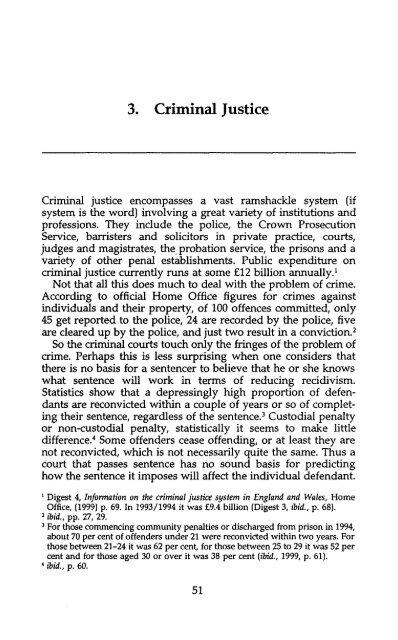HAMLYN - College of Social Sciences and International Studies ...
HAMLYN - College of Social Sciences and International Studies ...
HAMLYN - College of Social Sciences and International Studies ...
Create successful ePaper yourself
Turn your PDF publications into a flip-book with our unique Google optimized e-Paper software.
3. Criminal Justice<br />
Criminal justice encompasses a vast ramshackle system (if<br />
system is the word) involving a great variety <strong>of</strong> institutions <strong>and</strong><br />
pr<strong>of</strong>essions. They include the police, the Crown Prosecution<br />
Service, barristers <strong>and</strong> solicitors in private practice, courts,<br />
judges <strong>and</strong> magistrates, the probation service, the prisons <strong>and</strong> a<br />
variety <strong>of</strong> other penal establishments. Public expenditure on<br />
criminal justice currently runs at some £12 billion annually. 1<br />
Not that all this does much to deal with the problem <strong>of</strong> crime.<br />
According to <strong>of</strong>ficial Home Office figures for crimes against<br />
individuals <strong>and</strong> their property, <strong>of</strong> 100 <strong>of</strong>fences committed, only<br />
45 get reported to the police, 24 are recorded by the police, five<br />
are cleared up by the police, <strong>and</strong> just two result in a conviction. 2<br />
So the criminal courts touch only the fringes <strong>of</strong> the problem <strong>of</strong><br />
crime. Perhaps this is less surprising when one considers that<br />
there is no basis for a sentencer to believe that he or she knows<br />
what sentence will work in terms <strong>of</strong> reducing recidivism.<br />
Statistics show that a depressingly high proportion <strong>of</strong> defendants<br />
are reconvicted within a couple <strong>of</strong> years or so <strong>of</strong> completing<br />
their sentence, regardless <strong>of</strong> the sentence. 3 Custodial penalty<br />
or non-custodial penalty, statistically it seems to make little<br />
difference. 4 Some <strong>of</strong>fenders cease <strong>of</strong>fending, or at least they are<br />
not reconvicted, which is not necessarily quite the same. Thus a<br />
court that passes sentence has no sound basis for predicting<br />
how the sentence it imposes will affect the individual defendant.<br />
1 Digest 4, Information on the criminal justice system in Engl<strong>and</strong> <strong>and</strong> Wales, Home<br />
Office, (1999) p. 69. In 1993/1994 it was £9.4 billion (Digest 3, ibid., p. 68).<br />
2 ibid., pp. 27, 29.<br />
3 For those commencing community penalties or discharged from prison in 1994,<br />
about 70 per cent <strong>of</strong> <strong>of</strong>fenders under 21 were reconvicted within two years. For<br />
those between 21-24 it was 62 per cent, for those between 25 to 29 it was 52 per<br />
cent <strong>and</strong> for those aged 30 or over it was 38 per cent [ibid., 1999, p. 61).<br />
4 ibid., p. 60.<br />
51

















